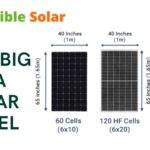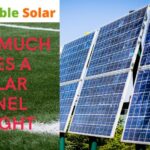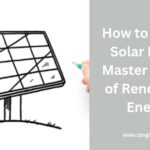How to Clean Solar Panels on RV Roof: Expert Tips for Maximum Efficiency
To clean solar panels on an RV roof, use a soft brush and soapy water, gently scrubbing the panels to remove dirt and debris.
Importance Of Regular Cleaning For Maximum Efficiency
Regularly cleaning the solar panels on your RV roof is crucial for ensuring maximum efficiency and optimal performance. Solar panels function by converting sunlight into electricity, which powers various appliances and systems in your RV.
Why Regular Cleaning Is Essential For Solar Panels On An RV Roof
Cleaning your RV roof’s solar panels regularly is essential for several reasons. Firstly, it helps to maintain the efficiency of the panels, enabling them to produce the maximum amount of electricity possible.
Dirt, dust, and debris can accumulate on the surface of the solar panels over time, blocking the incoming sunlight and reducing the efficiency of the system. By regularly cleaning the panels, you can remove these obstructive elements, allowing the panels to absorb the sun’s rays more effectively.
The Impact Of Dirt, Dust, And Debris On Solar Panel Efficiency
Dirt, dust, and debris have a significant impact on the efficiency of solar panels. When they accumulate on the surface of the panels, they create a layer that obstructs the sunlight from reaching the photovoltaic cells. These cells are responsible for converting sunlight into electricity.
When the panels are covered in dirt, dust, or debris, their ability to generate electricity is compromised. The layer of dirt acts as a barrier, reducing the amount of sunlight that can penetrate the surface and reach the cells. As a result, the panels produce less electricity, leading to a decrease in overall energy production.
Regular cleaning of the clean solar panels on RV roof removes these obstructive elements and ensures that the panels are exposed to the maximum amount of sunlight possible. This allows the photovoltaic cells to function optimally, generating the highest level of electricity and maximizing the efficiency of the entire solar system.
Safety Precautions To Take Before Cleaning
When it comes to cleaning the solar panels on an RV roof, safety should always be your top priority. Taking the necessary precautions ensures not only your well-being but also the successful completion of the task at hand. In this section, we will discuss some important safety measures to consider before starting the cleaning process.
Ensuring Personal Safety While Cleaning Solar Panels On An RV roof
To keep yourself safe during the solar panel cleaning process, it is crucial to follow certain guidelines. Here are some important precautions to take:
- Ensure you are wearing proper protective gear, including non-slip shoes, gloves, and safety glasses. This will help prevent any injuries from slippery surfaces, potential falls, or debris flying off the panels.
- Make sure that the weather conditions are suitable for cleaning. Avoid cleaning solar panels in extreme temperatures, high winds, or during rain or snowfall to prevent accidents or damage.
- Always turn off the power supply before cleaning the solar panels. This will minimize the risk of electrical shocks or accidents involving live circuits.
- Inspect the area around the RV roof for any obstructions, such as tree branches or power lines. Clearing away any potential hazards will ensure your safety during the cleaning process.
- If possible, have a partner nearby while cleaning the solar panels. They can assist, monitor your safety, and help in case of any emergencies.
Tips For Working At Heights And Avoiding Accidents
Cleaning solar panels on an RV roof often requires working at heights, which poses its own set of risks. Here are some essential tips to prevent accidents while working at heights:
- Use a sturdy and stable ladder specifically designed for working at heights. Make sure the ladder is positioned correctly and secured before climbing up.
- Always maintain three points of contact with the ladder or roof while working. To accomplish this, keep two hands and one foot—or two hands and one foot—firmly planted on the ladder or roof surface at all times.
- Avoid overreaching or leaning excessively while cleaning the solar panels. This can cause a loss of balance and potential falls.
- If available, use safety harnesses or other fall protection systems for added security and protection against accidents.
- Be cautious of any tripping hazards or slippery surfaces on the RV roof. Clear away debris, water, or any other substances that can increase the risk of accidents.
By keeping these safety precautions in mind, you can confidently clean solar panels on your RV roof while minimizing the risk of accidents or injuries.
Choosing The Right Cleaning Method
Choosing The Right Cleaning Method For Your RV Roof Solar Panels
Cleaning your clean solar panels on your RV roof is crucial to maximizing their efficiency and ensuring they continue to generate clean energy. However, it’s essential to choose the right cleaning method to avoid damaging the panels or voiding any warranties. In this section, we will explore considerations for choosing the most suitable cleaning method, including the type and condition of the solar panels on your RV roof.
Considering The Type And Condition Of The Solar Panels On Your Rv Roof
Before you decide on a cleaning method, it’s important to consider the type and condition of the solar panels installed on your RV roof. Different solar panels have different cleaning requirements, and using the wrong method can cause irreversible damage. Here are some key factors to consider:
Types of Solar Panels
There are two main types of solar panels commonly used on RV roofs:
- Monocrystalline: These panels are made from a single crystal structure and are known for their high efficiency. Monocrystalline panels require gentler cleaning methods to prevent damage to their delicate surface.
- Polycrystalline: Polycrystalline panels are made from multiple crystals, making them slightly less efficient but more cost-effective. These panels are generally more durable and can tolerate a slightly more rigorous cleaning approach.
Condition of Solar Panels
The condition of your solar panels also plays a role in determining the appropriate cleaning method. If your panels are new and relatively free of dirt, dust, and debris, a milder cleaning technique may be sufficient. However, if your panels are heavily soiled or covered in stubborn grime, you may need a more intensive cleaning method to achieve optimal results.
Comparison Of Different Cleaning Methods: Manual Vs. Automated
Now that you have considered the type and condition of your RV roof solar panels, let’s compare different cleaning methods to help you make an informed decision:
Manual Cleaning
Manual cleaning involves physically removing dirt and debris from the solar panels using non-abrasive materials such as a soft brush, sponge, or cloth. This method is suitable for mildly soiled panels and allows for greater control over avoiding potential damage. However, manual cleaning can be time-consuming, especially if you have a large number of panels or limited accessibility. Additionally, climbing on the roof can be risky and should be done with caution.
Automated Cleaning
Automated cleaning methods utilize specialized equipment to clean the solar panels automatically, making the process more efficient and less labor-intensive. This method is especially useful for larger RVs with extensive solar panel installations or for panels that are difficult to reach. Automated cleaning systems can use brushes, sprayers, or even robotic devices to remove dirt and debris effectively.
Considering the Factors
When choosing between manual and automated cleaning methods, consider the following factors:
- Frequency of Cleaning: If you prefer to clean your solar panels more frequently, manual cleaning may be a more convenient and cost-effective option.
- Efficiency: Automated cleaning tends to offer a more thorough and efficient cleaning process, especially for hard-to-reach areas.
- Cost: While manual cleaning methods require minimal equipment, automated systems may involve additional costs for purchase, installation, and maintenance.
Ultimately, the choice between manual and automated cleaning methods depends on your specific needs, preferences, and the characteristics of your RV roof solar panels.
Step-by-step Guide To Cleaning Solar Panels On Rv Roof
Regularly cleaning the solar panels on your RV roof is crucial to maintaining their efficiency and ensuring optimal energy production. Dust, dirt, bird droppings, and other debris can accumulate on the panels over time, reducing their ability to capture sunlight. In this step-by-step guide, we’ll walk you through the process of cleaning the solar panels on your RV roof, helping you maximize their performance.
Gathering The Necessary Cleaning Supplies And Equipment
Before you start cleaning your solar panels, it’s important to gather all the necessary supplies and equipment. Here are the items you’ll need:
- A soft-bristle brush or sponge.
- A bucket of warm water.
- A mild detergent or soap.
- squeegee or soft cloth.
- A hose or water source for rinsing.
Preparing The RV Roof And Panels Before Starting The Cleaning Process
Before cleaning your solar panels, you’ll want to take a few preparatory steps to ensure a successful cleaning session. Here’s what you need to do:
- Park your RV in a shaded or covered area. Cleaning your solar panels when they’re cool and out of direct sunlight helps prevent the cleaning solution from drying too quickly, leaving behind streaks or residue.
- Inspect the panels for any visible damage. If you notice cracks, water stains, or loose connections, it’s best to contact a professional to address these issues before proceeding with the cleaning.
- Turn off the solar system. It’s crucial to deactivate your solar panels to avoid any electrical accidents or damage during the cleaning process.
Techniques For Removing Dirt, Dust, And Stubborn Stains Effectively
Now that you have your supplies ready and have prepared your RV roof and solar panels, it’s time to start cleaning. Follow these techniques to remove dirt, dust, and stubborn stains effectively:
- Dampen the brush or sponge in the bucket of warm water mixed with a mild detergent or soap. Avoid using abrasive materials or harsh chemicals, as they can damage the surface of the panels.
- Gently scrub the solar panels using a damp brush or sponge. Pay attention to any heavily soiled areas and apply more pressure if needed, but be cautious not to apply excessive force that could cause damage.
- Rinse the panels thoroughly with clean water from a hose or water source. Ensure that all the soap and dirt are completely washed away.
- Use a squeegee or soft cloth to remove any remaining water droplets or streaks. This step helps prevent the formation of water spots, which can reduce the panel’s efficiency.
By following these step-by-step instructions, you can keep your solar panels clean and maintain their performance on your RV roof. Regular cleaning will ensure that your panels continue to produce energy efficiently and extend their lifespan. Remember to conduct routine maintenance and cleaning to maximize the benefits of your solar system.
Maintaining And Preventing Future Buildup
Keeping your RV’s solar panels clean and free from dirt and debris is essential to ensuring their optimal efficiency and longevity. Regular maintenance practices and adopting preventive measures can help you achieve this goal. Below are some helpful tips and guidelines to prevent future buildup on your solar panels and keep them functioning at their best.
Tips For Preventing Dirt And Debris Accumulation On Solar Panels
- Position your RV strategically when parking to minimize exposure to leaves, branches, and other falling debris. Parking underneath shaded areas or near trees with overhanging branches should be avoided.
- Consider installing a panel cover or shading device to shield your solar panels from direct contact with dirt, dust, and bird droppings. This can significantly reduce the amount of buildup on the panels.
- Regularly inspect the surrounding area for any potential sources of dirt or debris, such as nearby construction sites, dusty roads, or high-wind areas. Taking preventive measures in advance can save you from extensive cleaning efforts later on.
- Utilize gutter systems or other devices to divert rainwater away from the panels. Rainwater can carry dirt and contaminants, which may eventually settle on your solar panels.
- Consider using bird deterrents, such as spikes or netting, to prevent birds from roosting or nesting near your solar panels. This will reduce the chance of bird droppings accumulating on the surface.
Regular Maintenance Practices To Optimize Solar Panel Efficiency
To ensure maximum efficiency and performance, it is important to establish a routine maintenance schedule for your RV’s solar panels. The following practices will help keep your panels in top condition:
- Remove any loose debris or leaves using a soft bristle brush or a gentle stream of water. Avoid using abrasive materials or high-pressure washers, as they can damage the protective coatings on the panel surface.
- Regularly inspect the panels for any signs of damage, cracks, or loose connections. If detected, promptly address these issues to prevent further complications. It is recommended to consult a professional if serious damage is evident.
- Clean the panels using a mild detergent or specialized solar panel cleaner and a soft, lint-free cloth. Gently wipe the surface in a circular motion to remove any stubborn grime or residue. Rinse with water afterward and allow the panels to air dry.
- Monitor the performance of your solar panels periodically using a solar panel monitoring system or by checking your RV’s energy production. Any significant decrease in efficiency may indicate the need for further inspection or cleaning.
By adopting these preventive measures and implementing regular maintenance practices, you can ensure that your RV’s solar panels remain clean and optimized for superior energy production. Taking these steps will not only enhance the overall efficiency of your RV’s solar power system but also extend its lifespan.
Frequently Asked Questions Of How To Clean Solar Panels On RV Roof
Should You Use Windex on Solar Panels?
No, you should not use Windex on solar panels. Windex contains chemicals that can damage the panels and reduce their efficiency. It’s recommended to use a mild, non-abrasive cleaner and a soft cloth to clean solar panels.
Can I Use Dawn Dish Soap to Clean My Solar Panels?
Yes, you can use Dawn dish soap to clean your solar panels. However, make sure to dilute it with water and avoid abrasive materials or harsh chemicals that could damage the panels. Regular cleaning helps optimize their performance and efficiency.
How Often Do You Need to Clean Solar Panels in an RV?
Clean the solar panels in your RV at least once every three to six months for optimal performance. Regular cleaning helps to remove dirt, dust, and debris, ensuring maximum sunlight absorption for efficient energy generation.
What Is the Best Equipment to Clean Solar Panels on a Roof?
The best equipment to clean solar panels on a roof is a soft brush or sponge attached to a telescopic pole. Simply dip the brush/sponge in soapy water, gently scrub the panels, and rinse with a hose. Avoid using abrasive materials or high-pressure water, as they can damage the panels.
Conclusion
To keep you in top shape, regular cleaning is essential. By following a few simple steps and using the right equipment, you can easily remove dirt and debris, ensuring optimal performance and efficiency. Remember to always prioritize safety and handle the panels with care.
Don’t forget to check the manufacturer’s guidelines for any specific cleaning recommendations. With proper maintenance, your RV solar panels will continue to provide you with clean and renewable energy for years to come.




